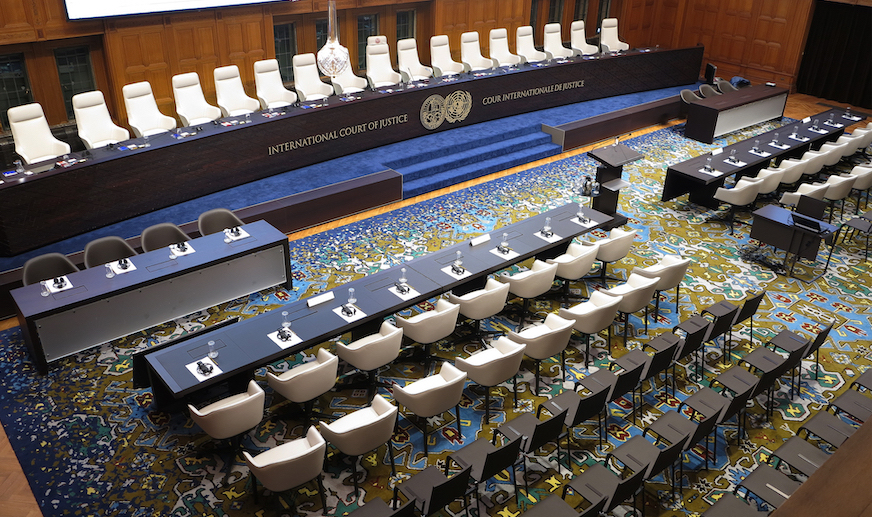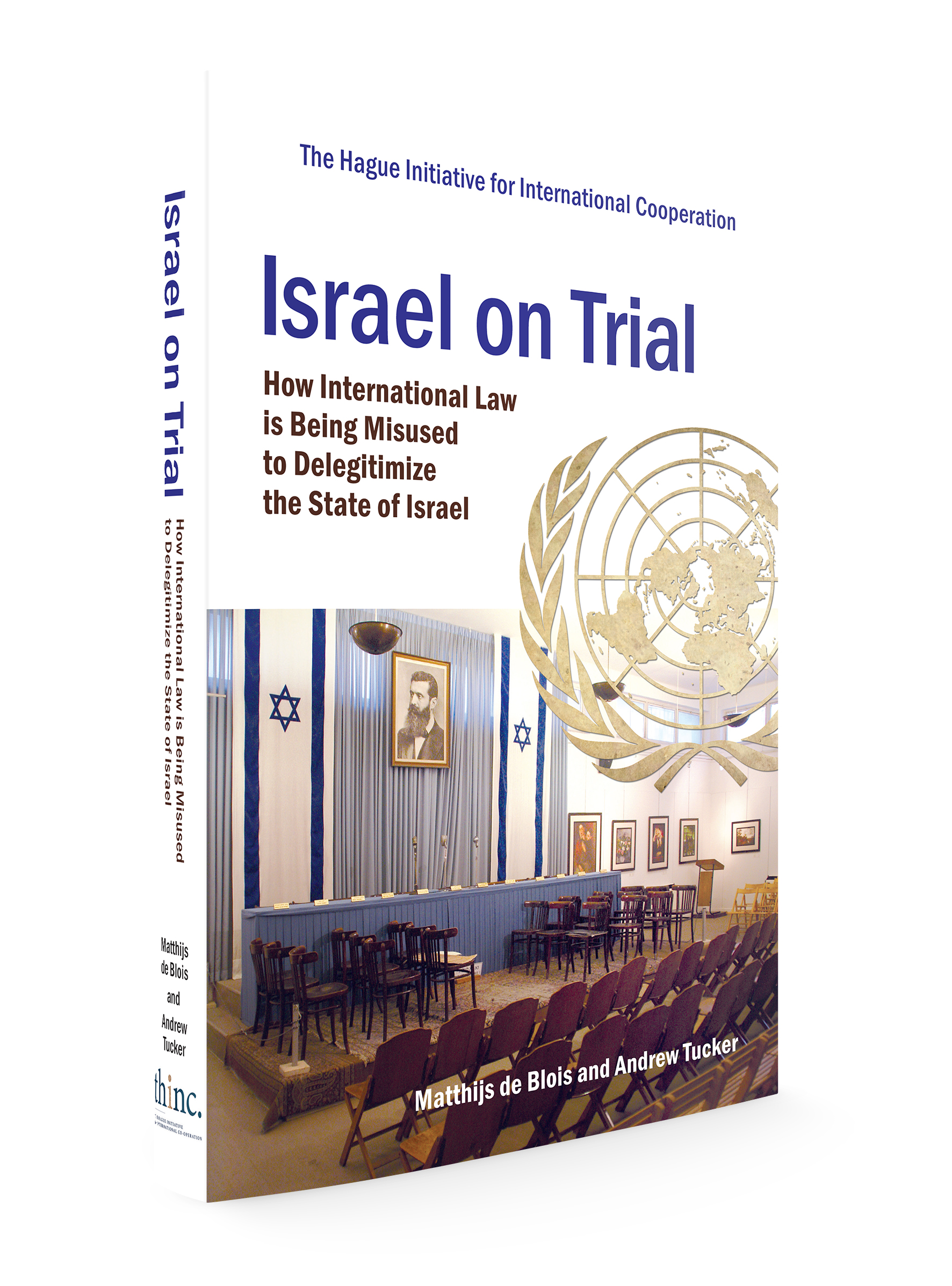Israel on Trial
There is no other state that continues to be the target of so much negative attention as Israel. Some refer to this as ‘lawfare’: the use of international law to undermine or attack the legitimacy and credibility of a state. The use of lawfare against Israel is a deliberate strategy adopted by those who deny its legitimacy, and it takes various forms.
It is important to emphasise that Israel is not, and should not be, immune from criticism or challenges based on law. Like all states, Israel is subject to international law and should comply with the law. Lawfare, however, is the discriminatory, deliberately false or unfair application of the law, or the instrumental use of law to achieve what in fact are military goals – the destruction of the state in its current form.
Lawfare, however, is the discriminatory, deliberately false or unfair application of the law
One means of ‘lawfare’ is proceedings (directly or indirectly) against Israel in international courts and tribunals. Other ways in which law is used to attack Israel include initiatives instigated by non-governmental organizations (NGO’s) using international law to challenge Israeli leaders visiting other countries; the use of international institutions, such as the UN Human Rights Council (UNHRC), to investigate and make allegations that Israel is breaching international human rights law; the ‘Boycott, Divestment and Sanctions’ (BDS) movement, which calls on governments and private companies to boycott Israel or Israeli companies or divest from investments in Israel; and ‘soft law’ initiatives to delegitimise Israel, for example by calling it an apartheid state.
The first of these is perhaps the most dangerous because decisions of courts and tribunals are seen as authoritative and binding. Currently, Israel is the subject of proceedings in the two main international law institutions in The Hague.
The International Criminal Court
The International Criminal Court (ICC) was established in 2002 in order to prosecute individuals for war crimes and crimes against humanity. In a way, it is a global manifestation of the Nuremberg trials against Nazi war criminals after World War II. Like the USA and several other states, Israel has never signed the Rome Statute which established the ICC and is thus not bound by the ICC. Nevertheless, Israeli leaders can be charged for war crimes committed on the territory of a state that is a party to the ICC Statute.
In 2015 the ‘Government of the State of Palestine’ purported to accede to the ICC statute, and lodged a declaration accepting the jurisdiction of the ICC over alleged crimes committed in ‘Palestinian’ territory. Since then, the Prosecutor of the ICC Fatou Bensouda has been undertaking a ‘preliminary examination’ of whether to open investigations against Israel for crimes committed on ‘Palestinian’ territory. The Prosecutor’s approach is disturbing for many reasons. One is that the Prosecutor is adopting a wide definition of statehood that seems to go beyond the intention of the ICC Statute. Under international law, a state only exists when it manifests the legal characteristics of statehood, the most important being that it must have an effective governing authority that actually governs a specific territory. ‘Palestine’ hardly fits that definition, because the Palestinians themselves argue that their territory is controlled by Israel.
The Prosecutor is examining two issues. The first concerns the question of whether Israel committed war crimes in the course of the 2014 Gaza hostilities (Operation Protective Edge). The second concerns the question of whether Israeli ‘settlements’ and other activities in the ‘Occupied Palestinian Territories’ constitute war crimes or crimes against humanity within the meaning of the Rome Statute. The latter claim is based on the view that (a) East Jerusalem and the ‘West Bank’ constitute occupied territory under international law, and (b) Israel has ‘deported or transferred’ its population into those territories since 1967. Both those views are highly controversial and problematic.
Notwithstanding the fact that there are many other allegedly ‘occupied’ territories in the world, and blatant cases of population transfer (e.g. Turkey in Northern Cyprus and Russia in Eastern Ukraine) no other leaders have been prosecuted for transferring their population into occupied territories. This is a clear case of singling out Israel for special treatment. It is not yet clear whether the Prosecutor will open an investigation into these issues, or – if she decides to do so – when this will happen.
The International Court of Justice
The International Court of Justice (ICJ) is the highest judicial body in the United Nations organization. The ICJ can hear and make decisions on disputes between states when all the states in question submit to its authority (so-called ‘contentious’ cases). The ICJ also can issue an ‘Advisory Opinion’ when asked to do so by a UN body, such as the General Assembly or the Security Council. One of the court’s most famous Advisory Opinions was the Opinion issued in 2004 when asked to do so by the UN General Assembly on the legality of the security barrier erected by Israel to defend itself against terror during the second intifada.
In 1980 Israel declared Jerusalem to be the undivided capital of the State of Israel
One of the proceedings currently before the ICJ concerns the city of Jerusalem. Following the attack of Israel by its neighbours in 1948, East Jerusalem, as well as Judea and Samaria (the ‘West Bank’), were illegally occupied by Jordan. When Israel took back control of these territories in 1967, it decided to apply Israeli law to the whole of the city. In 1980 it declared Jerusalem to be the undivided capital of the State of Israel. The Security Council denounced this move as illegal and demanded that all states remove their embassies from Jerusalem, which they did.
In 2017 President Trump announced the intention of the USA to move its embassy in Israel from Tel Aviv back to Jerusalem. The US embassy was actually moved in 2018.
‘Palestine’ has brought proceedings alleging it has a dispute with the USA under the Vienna Convention on Diplomatic Relations, under which diplomatic missions (i.e. embassies) must be located ‘in’ the host state’s territory. ‘Palestine’ alleges that Jerusalem is not ‘in Israel’. The Palestinians argue, amongst other things, that Jerusalem is a ‘corpus separatum’ pursuant to the UN General Assembly’s 1947 Partition Plan. This, of course, is a false claim, because that plan never came into effect. But first, the court must decide if Palestine is a state, as the court can only determine disputes between states. The court is expected to make a decision on this question in early 2020.






